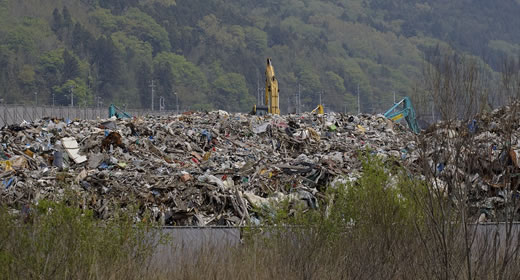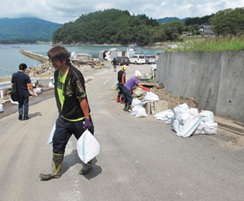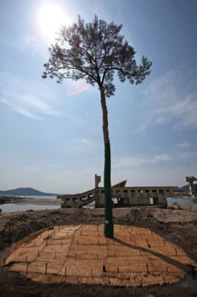
Japan has known earthquakes—the Great Kanto quake of 1923, the Great Hanshin quake of 1995, the Fukui quake of 1948, and hundreds of others—but Japan had never known an earthquake like the 9.0 Tohoku quake that struck just off the northeast coast last March. It was the fifth largest earthquake in recorded history, and the largest ever to hit the Land of the Rising Sun. The damage it left behind—mostly triggered by the massive tsunami that followed—was catastrophic.
The tremors shook southeastern Russia and the Northern Mariana Islands. Houses and buildings crumbled in Jayapura, Indonesia; Kailua Kona, Hawaii; and Pisco, Peru. A hemisphere away, vast portions of the Sulzberger Ice Shelf—two times the size of Manhattan—sheared into the sea. At the headquarters of the nonprofit Association for Aid and Relief (AAR) in Tokyo—230 miles from the epicenter—computers toppled and pictures crashed to the floor. But for Ford School master's of public policy student Yohei Chiba (MPP '12), the Tohoku earthquake hit home.
Warning sirens blared as coastal communities in the Iwate Prefecture where Chiba spent his childhood were struck by a 75-foot tsunami thirty minutes after the initial quake. Powerful seawater surges swept fishing boats over flood walls, tossed cars and busses through the streets, and tumbled buildings and homes, claiming the lives of 20,000 people, and leaving behind mounds of sodden debris—the remnants of a town. Only two buildings in coastal Rikuzentakata, the city where Chiba was born, remained standing. One was the hospital where Chiba's mother, director of nursing, spent the minutes following the earthquake rushing patients to higher floors to escape the rising waters. (Chiba's mother and her patients survived: staff who remained on the first floor did not.)
As reports of the disaster spread throughout the world, hundreds of millions of dollars in aid were quickly collected for those affected; however, Japan wasn't prepared to accept it. The government of Japan, and the nongovernmental organizations that operate there, were accustomed to providing support—not receiving it, explains Chiba, so the national infrastructure and policies weren't in place to admit international aid organizations. Provincial and city government officials were unprepared, too. The size of the disaster, the number of victims, the severity of the damage—all were unanticipated, and managing multiple offers of assistance without clear federal support was tricky. When early offers of support were declined, nonprofits everywhere recognized the extent of the challenge. For one of those nonprofits, Direct Relief International (DRI), Yohei Chiba provided an answer.
 |
|
A team of workers from the International Volunteer Center of Yamagata (IVY), one of the Japanese non-profits supported by Direct Relief International, clears the roadside in the Miyagi Prefecture. |
Chiba wanted to go home anyway. As soon as the quake struck, he wanted to go. But his uncle and younger brother in Tokyo had already tried to get there, and cautioned that the roads to Iwate were closed to all but emergency vehicles and government employees. If he wanted to help, Chiba would have to wait. As he waited, he began to plan for his return—looking for a way to spend his required summer internship in Japan. The need was so great that Chiba (a former financial and accounting professional with PricewaterhouseCoopers) would have accepted a position handing out water bottles. Tom Phillips, associate director of the Ford School's Graduate Career Services, knew Chiba could have a bigger impact by making use of his policy training. Phillips put him in touch with Ford School alumnus Andrew Schroeder (MPP '07), director of research and analysis for Direct Relief International, and just six weeks after the earthquake—the day after finals ended—Chiba boarded a plane.
On arrival, Chiba helped Direct Relief identify Japanese nonprofits working in the devastated areas, contact staff to learn about their programs and challenges, and find critical relief projects in need of additional support. With Chiba's language skills, cultural understanding, local connections, and program analysis experience, Direct Relief channeled $4 million in donations to eight NGOs engaged in vital Tohoku relief efforts.
 |
|
Of the 70,000 fir trees in Rikuzentakata, only a few survived. This 30-meter fir, near the hospital where Yohei Chiba was born, has been dubbed the "tree of hope." While the tree itself has suffered extensive damage from salt water exposure, it remains a national symbol of survival. |
The International Volunteer Center of Yamagata (IVY) was one of those organizations. IVY's Cash-for-Work program offered unemployed survivors jobs clearing mud and debris from homes and businesses that remained standing. Their efforts allowed shops to reopen and elderly residents to return to their homes while giving people meaningful work in the wake of tragedy. The Association for Aid Relief—AAR Japan—organized a mobile clinic to visit victims wherever they were, administer first aid treatment, and take them to the hospital as needed.
Early relief efforts like these focused on removing the debris that littered communities all along the coast and providing immediate relief to those who survived, but a year after the disaster, many large policy challenges remain.
In a region where businesses have been devastated, unemployment is a huge issue. However, creating new jobs isn't enough. Those jobs need to foster long-term economic development so Tohoku's young adults have a good reason to stay put as they graduate. In addition, Tohoku's people will need support and caring as they deal with post-traumatic stress and depression in the wake of inconceivable loss.
The larger nation may also need to address issues brought to light by the tsunami. Many of Japan's citizens have lost faith in the safety of nuclear power, and are calling upon leaders to find more secure energy alternatives. And nonprofits, which were so instrumental in helping the Tohoku region deal with the disaster, have historically been neglected. Chiba believes the nation could benefit from a large and healthy nonprofit sector that plays a more prominent role in society.
When Yohei Chiba entered the Ford School, he hoped to find a career that would allow him to utilize his accounting and finance skills. The experience in Tohoku, however, has changed him. International development, nonprofit management, disaster risk assessment, and economic development now hold much more appeal.
Below is a formatted version of this article from State & Hill, the magazine of the Ford School. View the entire Spring 2012 State & Hill here.
Middle photo by Direct Relief International and bottom "Hope Tree" photo by AP Photo/The Yomiuri Shimbun
More news from the Ford School